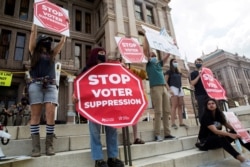A key U.S. centrist Democratic lawmaker, West Virginia Senator Joe Manchin, adamantly voiced his opposition Sunday to sweeping nationalization of voting laws favored by President Joe Biden and other Democrats.
Manchin, perhaps the most conservative Democrat in the 100-member U.S. Senate, said in an opinion article in a home-state newspaper, the Charleston Gazette-Mail, and in a “Fox News Sunday” television interview that he will continue to oppose the voting reforms because they are too partisan and have not drawn any Republican congressional support.
In the television interview, Manchin described the measure as “the wrong piece of legislation. It will continue to divide us.”
The national voting rights measure would overturn voting restrictions approved by at least 14 Republican-controlled state legislatures that would curb some expanded voting access that was deployed in the 2020 presidential election, such as extended voting hours, drive-through voting at central locations and the widespread use of mail-in balloting.
In his Charleston newspaper essay, Manchin argued that “congressional action on federal voting rights legislation must be the result of both Democrats and Republicans coming together to find a pathway forward or we risk further dividing and destroying the republic we swore to protect and defend as elected officials.”
“The truth, I would argue, is that voting and election reform that is done in a partisan manner will all but ensure partisan divisions continue to deepen,” he said.
The Democratic-controlled House of Representatives has already approved the legislation. Congressional Democrats overwhelmingly support it, with Republicans equally opposed.
Democrats have said the federal legislation is necessary, especially to ensure the voting rights of minorities, while accusing Republicans of trying to limit such voting because Blacks overwhelmingly vote for Democrats. Republicans say the new laws are needed to protect election security although there was no evidence of any substantial irregularities in the November 2020 election.
Manchin’s opposition imperils its passage in the politically divided Senate. Democrats, voting as a 50-member bloc, have been able to push through some legislation on 51-50 votes, with Vice President Kamala Harris casting the tie-breaking vote.
Democratic Senate Majority Leader Chuck Schumer has pledged to bring the voting rights legislation to a Senate floor vote in two weeks, but Republicans are likely to filibuster against it, forcing a 60-vote supermajority for passage. That would require Democrats to gain at least 11 Republican votes to support the legislation if Manchin maintains his opposition.
Some progressive Democrats have called for ending Senate filibusters to ease passage of legislation by simple majority votes, but Manchin, and some other Democrats, are opposed, saying the legislative tactic has benefited them when Republicans have controlled the Senate.
State passage of new voting restrictions has its roots in the November election, with some Republican state lawmakers voicing support for former President Donald Trump’s continuing baseless claims that the election was rigged and that he was cheated out of another four-year term in the White House.
The federal legislation Manchin opposes would set minimum standards for early voting that was widespread before the official Election Day on November 3 and mail-in voting that could override some of the state Republican voting laws.
Manchin has voiced support for these proposals but has not clarified where he stands on other provisions, such as requiring that congressional geographic redistricting every 10 years be done by nonpartisan commissions and establishing public financing for congressional campaigns.
Manchin said he favors limited voting rights reform, requiring the federal government to sign off on state election law changes, but his stance so far has only drawn support from one Republican, Senator Lisa Murkowski of Alaska.





